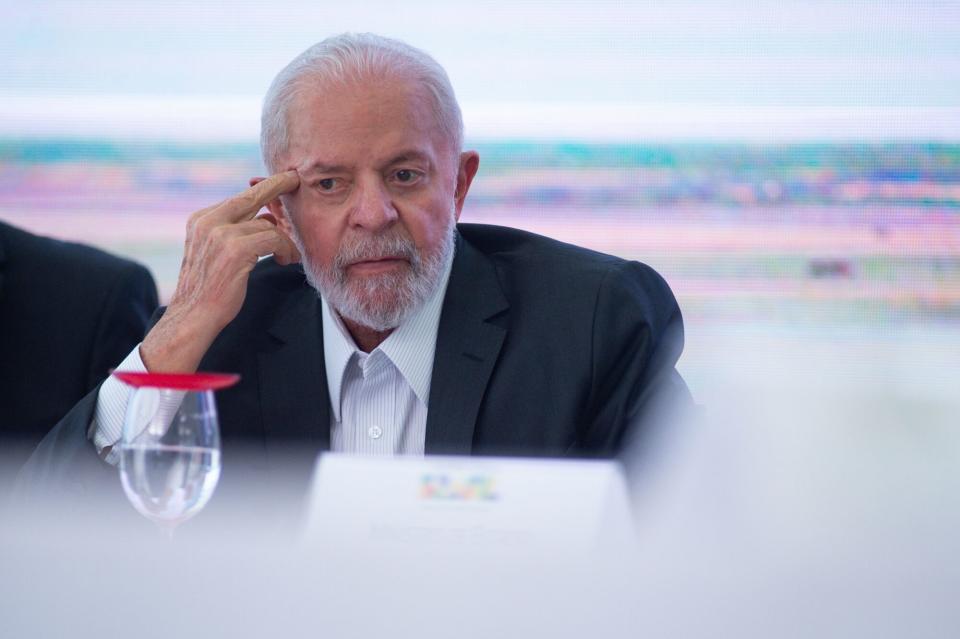Lula’s Old Playbook Fails to Win Over Hostile Brazilian Farmers
(Bloomberg) -- The record-setting crop financing plan Luiz Inacio Lula da Silva unveiled Wednesday follows a strategy that once made him one of the world’s most popular presidents: By unleashing government assistance to a vital sector, he could both boost the Brazilian economy and convert skeptics into supporters.
Most Read from Bloomberg
Kamala Harris Is Having a Surprise Resurgence as Biden’s Campaign Unravels
Biden’s Fourth of July Shrouded by Pressure to Drop 2024 Bid
Singapore Couples Are Marrying Earlier to Buy Homes, Leading Some to Regret
Newsom Shocks California Politics by Scrapping Crime Measure
But 18 months into his second stint as the country’s leader, it’s a playbook that is proving inadequate in such a polarized and ideologically-charged political moment.
The leftist who finished his first presidency in 2010 with approval ratings north of 80% is now mired in one of the most difficult periods of his career. His popularity has fallen below 40% — near the lowest levels of his current term — while his ambitious agenda has stalled in a conservative Congress immune to the old-school horsetrading on which he continues to rely.
With October municipal elections that will serve as a barometer of support looming, the crop financing plan — which will devote about 400 billion reais ($73 billion) to agribusiness — appears poised to become yet another political dud. Already, lawmakers aligned with the massive sector that remains heavily aligned with the Brazilian right have indicated that there’s little chance Lula can win them over.
“As long as they keep defending the Landless Workers’ Movement, defending Indigenous land demarcation, working against production, working against markets, and speaking ill of us, there’s nothing they can do to please us,” Pedro Lupion, who leads the congressional agribusiness caucus that includes roughly 60% of Brazilian lawmakers, said in an interview on the eve of the announcement.
Global Revolts
Agriculture has emerged as a fierce political battleground across the world, particularly in places where farmers have raged against the climate change-driven economic transitions leaders like Lula have sought to implement.
They have in many cases chosen to back the emerging right-wing movements that are gaining across Europe and now eyeing a November victory in the US, where Donald Trump is again seeking to shore up support among farmers.
It’s a new world for Lula, who enjoyed positive relations with the agribusiness sector during the commodities-fueled economic boom of his first presidency.
The industry has continued to grow in importance — agriculture accounts for about 24% of gross domestic product, 50% of exports and roughly a quarter of the country’s jobs. But farm ties to the left broke almost completely under right-wing President Jair Bolsonaro, an ideological ally of the sector not just on agriculture but on guns, social issues, public security and other conservative causes.
Rebuilding them has proved a nearly impossible task for Lula, who narrowly defeated Bolsonaro in 2022 on a platform that included promises to bolster protections for the Amazon rainforest, shield tribal lands from resource extraction and spark a green transition of Brazil’s economy.
He has made overtures: Last year’s crop plan also set a record, and Lula included hundreds of agribusiness leaders on a China trip meant to boost farm trade.
But he has at times criticized them as well, blaming agribusiness for supporting the 2023 insurrection attempt against his government and chastising lawmakers for pushing to curb Indigenous land rights. The rural caucus, meanwhile, started 2024 pledging to wage an offensive against Lula’s agenda in Congress.
“The ideological issue will never be overcome, but no one has done as much for agriculture as President Lula,” Jose Guimaraes, the government’s leader in the lower house of Congress, said in an interview Wednesday. “Agricultural agents are often unfair to the president.”
Shifting Winds
Political changes are not the only culprit: Under Bolsonaro, Brazil’s Congress amassed more power over the federal budget, limiting the president’s ability to sway members with pork spending or ministerial positions. In recent months, Lula has suffered numerous legislative setbacks in which even parties with spots with his cabinet joined the opposition.
Recent actions have further dented relations with the agribusiness caucus. A surprise tax change proposed by Finance Minister Fernando Haddad ignited the ire of crop traders and caused Chinese buyers to turn toward US-produced soy last month.
While the Senate ultimately slapped down the proposal, it caused an irreversible loss of faith in Haddad, leaving Agriculture Minister Carlos Favaro and Vice President Geraldo Alckmin as the only ministers with working links to the sector, Lupion said.
Lula has time to recover before the 2026 presidential election. His current struggles have strengthened the sense among opponents, however, that the political winds are shifting in their favor. Last year’s victory for libertarian Argentine leader Javier Milei, the strength of Marine Le Pen’s far-right party in French congressional elections and the prospect of Trump’s return have all fueled hopes of a resurgence.
They may receive another jolt this weekend. Basking in wins that have bolstered his position in a rivalry with Lula, Milei is set to make his first visit to Brazil — not to mend fences with his counterpart, but to attend a conservative rally alongside Bolsonaro in the southern state of Santa Catarina, an agribusiness powerhouse and stronghold of the Brazilian right.
--With assistance from Clarice Couto.
Most Read from Bloomberg Businessweek
Dragons and Sex Are Now a $610 Million Business Sweeping Publishing
For Tesla, a Smaller Drop in Sales Is Something to Celebrate
The Fried Chicken Sandwich Wars Are More Cutthroat Than Ever Before
©2024 Bloomberg L.P.

 Yahoo News
Yahoo News 


